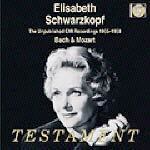
Elisabeth Schwarzkopf sings
 $38.00
Out of Stock
$38.00
Out of Stock6+ weeks add to cart
BACH / MOZART
Elisabeth Schwarzkopf sings
Elisabeth Schwarzkopf (soprano) / Philharmonia Orchestra
[ Testament / CD ]
Release Date: Friday 14 July 2000
This item is currently out of stock. It may take 6 or more weeks to obtain from when you place your order as this is a specialist product.
The wonderful works of Bach & Mozart prformed to perfection!
TESTAMENT is an artist-based label, not restricted to any period of recording history, and its issues are selected
from the archives of some of the largest record companies in the world.
This new Testament CD brings together previously unpublished Bach studio recordings from 1957-58. It was a nice idea in 1957 to record 'Sheep may safely graze' from the hunting cantata Was mir behagt and the soprano aria Mein ghiubiges Herze' which derives in part from the same cantata. The performance of the latter is pure delight, every bit as fine as Schwarzkopf's 1950 version. It was probably never released because it was felt by someone (Walter Legge, presumably) that 'Sheep may safely graze' could be better done, and for the 1958 re-recording orders clearly went out to sharpen up the recitative and intensify the singing of the aria itself. As in the 1958 remake of Cantata No.199, this results in Schwarzkopf producing a creamier, more covered tone and a closer, warmer, recorded bal-ance. The flute duo doesn't fade into the woodwork quite so much as before. The harpsichord, however, is now too prominent. Of Schwarzkopf's three recordings of the aria - 1946 (Références), 1957 and 1958 (Testament), the 1957 version is the one to treasure.
Her 1957 recording of Cantata 199, Mein Herze schwimmt im Blut (on Référenccs, where it is stated, incorrectly, to be the 1958 recording), is also deeply treasurable. Until its joyous final movement, this is one of the darkest most self-abasing of the Bach cantatas. As Jonathan Freeman-Artwood wrote in these columns in March, few recordings challenge Schwarzkopf's with its 'contemplative nobility'. How one relishes the exclamation 'Ach ja!' in the recitative 'Ah yes! his heart breaks and my soul speaks', touching in a way that is utterly un-marschellin-like. Or the colouring of the word 'Geduld' ('patience') in the aria 'Tief gebückt'. Or the marvellous run on 'fröhlich' ('joyfully') in the recitative before the closing aria. It would be misleading to say that the 1958 recording, which Testament now puts out for the first time, lacks such skill or empathy. It is, nonetheless, a much cloudier-sounding
performance.
In February 1959, Schwarzkopf sang the Wedding Cantata with Klemperer at a concert in Amsterdam. She herself is said to prefer that live recording (Références) to this unpublished 1957 studio version (Testament). One can see why. It is a performance of terrific character and elan. (Was Klemperer remembering his youthful elopement with Elisabeth Schumann, with whom he occasionally performed this cantata? Or planning to make off with Mme Schwarzkopf into the February night?) Set the two performances side by side and there is no doubt which most seizes the attention.
Which isn't to say that the Amsterdam record-ing is the one to hear in the privacy of one's own home. There is a decorousness and intimacy about the 1957 studio recording (wonderful obbligato playing by Sidney Sutcliffe, Hugh Bean, Raymond Clark and organist Geraint Jones) which perfectly suits a more intimate kind of listening.
The Mozart concert aria, with which the anthology begins, seems to have lain unissued at the time of the recording in 1955, possibly for want of a suitable coupling. Schwarzkopf's 1968 recording with Brendel, Szell and the LSO is justly celebrated. This earlier version, made with another exemplary Mozartian, Géza Anda, and that unsung master of the art of sympathetic accompaniment, Otto Ackermann, is possibly even more important. Mozart wrote the aria for the 21-year-old Nancy Storace in December 1786: the piano obbligato an earnest expression of the pleasure he took in making music with Mlle Storace (and not only music, biographers from Jahn onwards have suggested). Schwarzkopf, heard here in the summer morn-ing of her art, sings the aria wondrously well.
From a review by Richard Osborne Gramophone, June 2000.
Tracks:
Mozart:
Concert Aria/Konzertarie - Ch'io mi scordi di te?...Non temer, amato bene, K.505
Philharmonia Orchestra - Géza Anda - piano
conducted by Otto Ackermann
Bach:
Cantata - Weichet nur, betrübte Schatten, BWV202
Cantata - Mein Herze schwimmt im Blut, BWV199
plus excerpts from:
Cantata - Also hat Gott die Welt geliebt, BWV68
Cantata/Kantate - Was mir behagt, ist nur die muntre Jagd, BWV208
Philharmonia Orchestra - Sidney Sutcliffe: oboe
conducted by Thurston Dart
